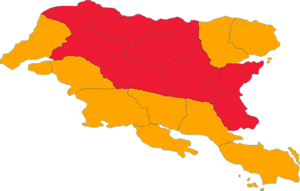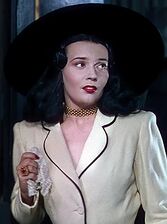Gylian presidential election, 1968
| |||||||||||||||||
| Turnout | 95,1% | ||||||||||||||||
|---|---|---|---|---|---|---|---|---|---|---|---|---|---|---|---|---|---|
| |||||||||||||||||
 | |||||||||||||||||
| |||||||||||||||||
A presidential election was held in Gylias on 22 January 1968.
Incumbent Reda Kazan was re-elected, defeating Ludmila Canaşvili, who was supported jointly by the Centre Group and Union for a New Republic. Both candidates enjoyed notable support from famous artistic figures during the election, and Ludmila was the first presidential candidate to make foreign policy an issue, promising to support Karvelebi independence in the Zemplen Conflict.
Procedure
The election was held through instant-runoff voting.
Candidates were registered with Elections Gylias in accordance with normal procedures. They could either be nominated by a political party or electoral bloc, civic organisations, or self-nomination as independents.
Candidates
| Candidate | Nominator | Office(s) held | Details | ||
|---|---|---|---|---|---|
| Reda Kazan | 
|
Progressive Alliance | President of Gylias (since 1961) |
Campaigned on promotion of culture, the arts, and socialised luxury. | |
| Ludmila Canaşvili | 
|
Centre Group–Union for a New Republic | None | Campaigned on promotion of socialised luxury, polymathism, and support for Zemplen independence. | |
| Ser Şanorin | 
|
Independent | Senator for Tomes (since 1962) |
Campaigned on promotion of aristerokratia. | |
| Violet Bonham | 
|
Liberal Union | None | Campaigned as the main liberal candidate. | |
| Maria Elena Durante | 
|
Movement for Emancipation and Democracy–New People's Party | Senator for Ḑarna (since 1962) |
Campaigned on promotion of economic nationalism and left-wing populism. | |
| Françoise Chatelain | 
|
OMFLG–ACFEN | None | Campaigned on promotion of francité. | |
| Luiza Monteira | 
|
Centre of Constitutional Monarchists | Deputy for Nerveiík-Iárus-Daláyk (since 1962) |
Campaigned on promotion of monarchism. | |
Results
| Candidate | Nominator | First count | % | Final count | % | |
|---|---|---|---|---|---|---|
| Reda Kazan | PA | 1.278.207 | 24,0% | 2.428.113 | 50,1% | |
| Ludmila Canaşvili | CG–UNR | 1.262.229 | 23,7% | 2.418.420 | 49,9% | |
| Ser Şanorin | Independent | 921.374 | 17,3% | |||
| Violet Bonham | LU | 665.733 | 12,5% | |||
| Maria Elena Durante | MED–NPP | 575.193 | 10,8% | |||
| Françoise Chatelain | OMFLG–ACFEN | 410.091 | 7,7% | |||
| Luiza Monteira | CCM | 149.124 | 2,8% | |||
| Others/write-ins | 63.910 | 1,2% | ||||
| Total | 5.325.861 | 100% | 4.846.534 | 100% | ||
| Registered voters and turnout | 5.662.563 | 95,1% | ||||
Maps
Analysis

The unique circumstances of the previous election gave way to some realignments. Ludmila Canaşvili's candidacy announcement drove a surge of excitement, as her existing fame made her a strong challenger to incumbent Reda Kazan.
Ludmila mounted a vigorous whistle-stop campaign across Gylias, travelling standing up on a landaulette and wearing the "Mila suit" she'd wore in The Red Shoes, which helped attract large crowds to her events. Reda and Ludmila showed a strong camaraderie at public meetings, due to their shared support for the arts and socialised luxury. Reda quipped at one such meeting, "I promise you that no matter which of us wins, we'll tighten up some dress standards around here."
Both Reda and Ludmila were identified with arts and culture, attracting heightened attention and support from Gylias' artistic scenes. Ludmila also highlighted her Karvelebi identity during her campaign, filming one PPB on the Ruvelka–Syara border, attacking the Syaran occupation of Zemplen and calling for Zemplen independence.
In the first count, Reda lost her anomalous majority, winning 24% of first preference votes, but keeping pluralities in most of the mainland. Ludmila was close behind with 23,7%, and pluralities in the south. Violet Bonham won pluralities in Arxaþ, Alţira, and Elena, cementing their status as Liberal Union strongholds.
Ser Şanorin won pluralities in Mişeyáke, Nezyál, Tomes, and Sváen, and finished third overall. Maria Elena Durante campaigned heavily in northern Gylias, and performed well in Salxar, Makarces, Gacar, and Gerşyr, but didn't win any regional plurality.
Since both the final candidates were equally respected and popular, several commentators likened the final round to a coin flip. Columnist Denise Sarrault jokingly dubbed the final result "a contest between two black hats", in reference to Reda and Ludmila's wardrobes.
In the final count, Reda largely gained vote transfers from Maria Elena's voters, while Ludmila received the most transfers from Françoise and Luiza's voters. Françoise voters overwhelmingly backed Ludmila in second preferences, as she had made a point of not using English in her campaign. Transfers from Ser were mostly evenly split, since both Reda and Ludmila could be identified with aristerokratia. Although Violet ran a centre-left campaign, her voters' preferences unexpectedly transferred more to Ludmila.
Ludmila won Nerveiík-Iárus-Daláyk, the most populated region, in the final count, and took much of southern and western Gylias, plus Violet's regions. The final result was close: Reda and Ludmila were tied for regions carried, and Reda won 50,1% of the final count to Ludmila's 49,9%. Ludmila was less than 10.000 votes short of beating Reda, the closest reelection for an incumbent president.
The People's Voice commented that since Ludmila's campaign was almost entirely devoid of policy and boiled down to asking voters "Do you want Ludmila Canaşvili to be your president?", her narrow loss was commendable and a reflection of her illustrious reputation. The quality of the contest was such that jokingly expressing a wish that Ludmila would've won became a famous idiom in Gylias. Even Reda jokingly expressed shock at the final result and claimed to have voted for Ludmila; she would later pay her tribute as "an opponent I felt honoured to nearly lose to".



